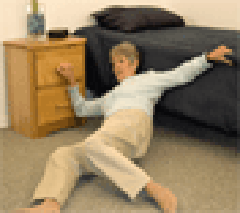Hearing Loss and Falling
|
|
HEARING LOSS LINKED TO THREE-FOLD RISK OF FALLING
Release Date: 02/27/2012 Source: Johns Hopkins Medicine Hearing loss has been linked with a variety of medical, social and cognitive ills, including dementia. However, a new study led by a Johns Hopkins researcher suggests that hearing loss may also be a risk factor for another huge public health problem: falls. The finding could help researchers develop new ways to prevent falls, especially in the elderly, and their resulting injuries that generate billions in health care costs in the United States each year, by some estimates. To determine whether hearing loss and falling are connected, Frank Lin, M.D., Ph.D., at Johns Hopkins, and his colleague Luigi Ferrucci, M.D., Ph.D., of the National Institute on Aging, used data from the 2001 to 2004 cycles of the National Health and Nutrition Examination Survey. This research program has periodically gathered health data from thousands of Americans since 1971. During those years, 2,017 participants ages 40 to 69 had their hearing tested and answered questions about whether they had fallen over the past year. Researchers also collected demographic information, including age, sex and race, and tested participants’ vestibular function, a measure of how well they kept their balance. Their findings are published in the Archives of Internal Medicine. Lin, an assistant professor at the Johns Hopkins University School of Medicine and the university’s Bloomberg School of Public Health, and Ferrucci found that people with a 25-decibel hearing loss, classified as mild, were nearly three times more likely to have a history of falling. Every additional 10-decibels of hearing loss increased the chances of falling by 1.4 fold. This finding still held true, even when researchers accounted for other factors linked with falling, including age, sex, race, cardiovascular disease and vestibular function. Even excluding participants with moderate to severe hearing loss from the analysis didn’t change the results. Lin, an otologist and epidemiologist, says among the possible explanations for the link is that people who can’t hear well might not have good awareness of their overall environment, making tripping and falling more likely. Another reason hearing loss might increase the risk of falls, Lin adds, is cognitive load, in which the brain is overwhelmed with demands on its limited resources. “Gait and balance are things most people take for granted, but they are actually very cognitively demanding,” Lin says. “If hearing loss imposes a cognitive load, there may be fewer cognitive resources to help with maintaining balance and gait.” Funding support for this study was provided by the National Institutes of Health. |
